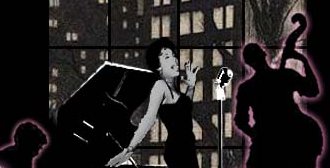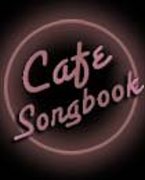Welcome toCafe SongbookInternet Home of the |
 |
 |
| Home || Songs || Songwriters || Performers || Articles and Blogs || Glossary || About Cafe Songbook || Contact/Submit Comment | |
| Search Tips: 1) Click "Find on This Page" button to activate page search box. 2) When searching for a name (e.g. a songwriter), enter last name only. 3) When searching for a song title on the catalog page, omit an initial "The" or "A". 4) more search tips. | |
Dorothy Fields |
||||
|
Basic InformationBorn: July 15, 1905, Allenhurst, New Jersey Died: March 28, 1974 (age 68), New York City Primary songwriting role: lyricist; also theater book author andlibrettist Co-writers: chiefly Jimmy McHugh, Jerome Kern, Arthur Schwartz, Fritz Kreisler, Sigmund Romberg, Morton Gould, Harold Arlen, Harry Warren, Burton Lane, Albert Hague, |
|||
Overview and Commentary: |
|
|
For William Zinsser, Dorothy Fields was first among the small group of women popular songwriters during period of The American Songbook. He divides the women into two groups of three: those who made "a sizable contribution to the literature of American popular song" and those who left "a small but exceptional legacy." The former group included, along with Fields, Betty Comden and Carolyn Leigh, the latter, Kay Swift, Ann Ronell and Dana Suesse. Zinsser notes that the members of this "barely remembered" second trio were "gallant also-rans in a mans race." As for Fields, Zinsser reminds us that she might have gotten a head start by belonging to a very successful show business family headed by her father Lou Fields, most well known as half of the vaudeville comedy team of Weber and Fields as well as a successful Broadway producer. He is quick to add, however, that Dorothy was not in any "need of nepotistic favors," eventually becoming one of the most successful of all songbook songwriters with more than 400 songs written over four decades to her credit. Zinsser credits much of her success to her ability to write directly with no affect: Her lyrics" say what someone in love should say--no inversion, no allusion, no poetic effects:
"This is the English language at its most declarative--a writer making her feelings available to us." (Zinsser, pp. 107-111) |
| Dorothy Fields and the Songwriters Hall of Fame | Fields was inducted into The Songwriters Hall of Fame in its first year, 1971, with Harold Arlen, Duke Ellington, Leonard Bernstein, George Gershwin, Yip Harburg, Hoagy Carmichael, Harry Warren and Johnny Mercer; |
| Dorothy Fields' Collaborators | Dorothy Fields collaborators included Jerome Kern, Sigmund Romberg, Harold Arlen, Arthur Schwartz, Burton Lane, Jimmy McHugh, Morton Gould, Harry Warren, Albert Hague, J. Fred Coots, and Cy Coleman, so it is not hard to understand why, by her own description, she was "just one of the boys." And as Deborah Grace Winer notes, Fields never had the name recognition that almost all of her "boy" songwriting partners achieved. "Certainly, her personal fame outside the entertainment community never came close to being commensurate with the renown of the standards she produced. Up until her death in 1974, she often encountered people who would suddenly exclaim in realization, You wrote that?" -- a situation that, publicly, anyway, she'd always joke about." (Winer, xvi). |
|
Ken Bloom comments that Dorothy Fields was able to write with a group of collaborators who were "wildly diverse in style." Bloom also reflects that Fields was not only flexible in her ability to write with such a wide range of composers but was "able to keep up with her times, using contemporary idiomatic phrases without sounding forced or trendy." In an "aside," Bloom points out Fields' inclination to employ the negative in her titles, such as "I Can't Give You Anything But Love," You Couldn't Be Cuter," and "Nobody Does It like Me" (Bloom p. 225). |
| Betty Comden on Dorothy Fields |
"The marvelous thing about the way Dorothy wrote is that her lyrics were inventive without being tricky." from Betty Comden's forward to, On the Sunny Side of the Street: The Life and Lyrics of Dorothy Fields, New York: Schirmer Books, 1997, p. IX. |
Cy Coleman on
|
Fields' biographer Charlotte Greenspan informs us that after the 1959 show Redhead for which Dorothy co-authored the book and wrote the lyrics, and which had swept the Tonys in all musical categories, it appeared that her career was over. "For more than five years, there was no Broadway show, no musical, no movie featuring songs with new lyrics by Dorothy Fields." But that was about to change. Greenspan lets Cy Coleman tell the story:
Coleman and Fields wrote music and lyrics respectively for Sweet Charity (1966) and Seesaw, (1973), Fields' last show. |
 Max Wilk, They're Playing Our Song: Conversations with America's Classic Songwriters (originally published 1973 as They're Playing Our Song: From Jerome Kern to Stephen Sondheim—The Stories behind the Words and Music of Two Generations), New York and Stratford, CT: Easton Studio Press, 2008. |
Dorothy Fields on integrating a song into a show and on writing the book for a show. "If you don't have a story that will hold the audience, you won't have a successful show. And as for the songs that go into that book, they have got to move the plot forward. I don't care how good a song is--if it holds back the story line, stalls the plot, your audience will reject it" (Wilk, p. 43). She adds, "I'm not out to write popular song hits, though I've written songs that have become popular; I'm writing a song to fit a spot in the show. To fit a character, to express something about him or her . . . to move that story line forward" (Wilk, p. 45). Despite Dorothy's feelings about the importance of integrating a song into a show's book, she was relatively easily charmed out of her principles by Cole Porter. Fields' brother Herb Fields wrote the books for several Porter shows and Dorothy collaborated with him on the book for for the 1941 Porter show Let's Face It. Dorothy told Max Wilk,
On the occasion of Let's Face It trying out in Boston, Dorothy, her brother and Porter were in the lobby during intermission eavesdropping on comments by audience members: "And right next to us was a very aristocratic old dame. She said, 'I don't know how these actors think up all those funny things to say!' Cole was delighted with her remark. He nudged us, and he asked, 'You Fieldses want to write book?'" When Max Wilk followed up on her anecdote by asking Fields if when she was writing the book for Let's Face It, she wasn't reluctant "to retire as a lyricist and bequeath that spot to Mr. Porter?" Her answer was, "Oh, honey, let me tell you, it's great. The book is always the toughest thing to do; one doesn't need the added responsibility of doing the lyrics, I can assure you. (Wilk, pp. 43-44) |
| back to top of page | |
Cafe Songbook |
|
| Dorothy Fields on Wild Women of Song -- narrated by Pamela Rose | |
| Wild Dorothy Fields, Part 1 |
Dorothy Fields, Part 2 |
Dorothy Fields, Ethel Merman and Annie Get Your Gun (Part 3) |
Dorothy Fields, The Comeback / Finale (part 4) |
Wild Women of Song: Dorothy Fields, Ethel Merman and Annie Get Your Gun (Part 3) narrated by Pamela Rose  An Evening with Dorothy Fields Recorded Live at the 92nd Street Y, New York City Lyrics and Lyricists series April 9, 1972 |
 Dorothy Fields: American Songbook Series The Smithsonian Recordings Collection (collected and produced in 1992) |
 Yours For A Song: The Women Of Tin Pan Alley (DVD includes archival footage of Dorothy Fields) |
 A Fine Romance: Dorothy Fields Songbook with |
| Two Dorothy Fields Songs Not Currently in the Cafe Songbook Catalog. | |
|
Peter Mintun plays and sings the McHugh-Fields song "Dinner at Eight" from 1933, a song that was written as the title song for the famous movie but not used in it. The song, as Mintun demonstrates, was eventually marketed as being "dedicated" to the movie. |
Hildegard sings the 1935 Jerome Kern-Dorothy Fields song, "I Dream Too Much" written for the movie of the same title in which it was sung by Lily Pons. |
| back to top of page | |
|
|
|||||||||||||
| back to top of page | ||||||||||||||
Visitor CommentsSubmit comments on songs, songwriters, performers, etc.
Feel free to suggest an addition or correction. Please read our Comments Guidelines before making a submission. (Posting of comments is subject to the guidelines. Not all comments will be posted.) |
| To submit a comment, click here. |
Posted Comments on Dorothy Fields:
No comments as yet posted |
| back to top of page |
CreditsDorothy Fields page) |
Credits for Videomakers of videos used on this page:
Borrowed material (text): The sources of all quoted and paraphrased text are cited. Such content is used under the rules of fair use to further the educational objectives of CafeSongbook.com. CafeSongbook.com makes no claims to rights of any kind in this content or the sources from which it comes.
Borrowed material (images): Images of CD, DVD, book and similar product covers are used courtesy of either Amazon.com
Any other images that appear on CafeSongbook.com pages are either in the public domain or appear through the specific permission of their owners. Such permission will be acknowledged in this space on the page where the image is used.
For further information on Cafe Songbook policies with regard to the above matters, see our "About Cafe Songbook" page (link at top and bottom of every page). |
| Home || Songs || Songwriters || Performers || Articles and Blogs || Glossary || About Cafe Songbook || Contact/Submit Comment | |
© 2009-2018 by CafeSongbook.com -- All Rights Reserved |



